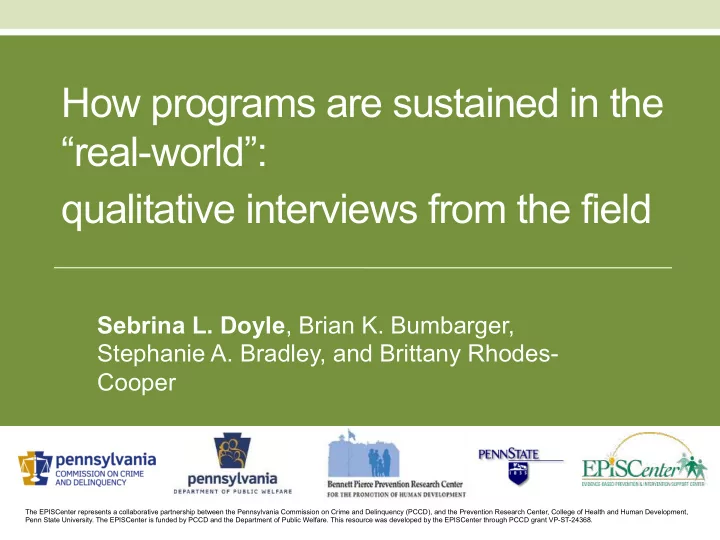

How programs are sustained in the “real-world”: qualitative interviews from the field Sebrina L. Doyle , Brian K. Bumbarger, Stephanie A. Bradley, and Brittany Rhodes- Cooper The EPISCenter represents a collaborative partnership between the Pennsylvania Commission on Crime and Delinquency (PCCD), and the Prevention Research Center, College of Health and Human Development, Penn State University. The EPISCenter is funded by PCCD and the Department of Public Welfare. This resource was developed by the EPISCenter through PCCD grant VP-ST-24368.
Background • EPISCenter is an intermediary organization that helps to connect research, policy, and real-world practice. Funded by the Pennsylvania Commission on Crime and Delinquency (PCCD) and the Department of Public Welfare. • Serve grantees funded by PCCD to implement Evidence-Based Programs. • Annual Survey of Evidence Based Programs (ASEP) began in 2001 as a research project of the Prevention Research Center with these grantees. • Extending work done by Tibbits, Bumbarger, Rhodes-Cooper, and other colleagues on sustainability in Pennsylvania through the ASEP.
Project description • Conducted phone interviews with between 2012 and 2013 with 50 Grantees (31 two-year, 19 four-year) previously funded by PCCD the quarter following their grant funding ending. • Asked qualitative and quantitative questions related to program sustainability. • Interested primarily in HOW the program was sustaining rather than WHETHER it was continuing.
Sample Participating Programs 16 14 12 10 8 4 year 6 2 year 4 2 0 BBBS SFP IYS PATHS ART MTFC LST OBPP 10-14
Program continuation • 90% of grantees 4% indicated that their 12% 6% programs would Closed continue at some Unclear level. Reduced 35% 43% Same • 47% of grantees indicated no Higher reduction in services.
Program Reductions The most common reductions to the program were participant slots, staffing, and components available 35% 30% 25% 20% Child Tx (N=5) 15% School (N=13) Mentoring (N=14) 10% Family Rx (N=18) 5% 0% # of # of Staff # of fidelity or supervision participation Participants components outcome incentives offered monitoring
FINANCIAL SUSTAINABILITY
Current Funding Donations/Grants Non-Grant sources PCCD grants Turned over program 0% 20% 40% 60% 80% 100% 4-Year 2-year
Government funding sources 10 9 8 7 6 5 4 School-based (N=18) 3 Mentoring (N=14) 2 1 Child Intervention (N=5) 0 Family Prevention (N=13)
Other funding sources 20 15 10 School-based 5 Mentoring Child Intervention 0 Family Prevention
Going back to the same funder … • Nineteen respondents (38% of grantees) interviewed had 10% 16% another grant funded Continuation through PCCD Expansion • The majority of Other Program grantees received grants for expansions 74% either in population type or location
Turned over program 26% of grantees indicated turning program over to partner upon completion of grant. 100% 90% 80% 70% 60% 50% 40% 4 year 30% 2 year 20% 10% 0%
Interesting findings … • Financial sustainability looks different depending on program type (consistent with Schierer, 2013). • Longer grant times my assist programs with embedding into existing infrastructures. • It is possible to turn over non school-based programs to community partners!
Interesting findings … • Programs that have been turned over to a partner are difficult to track. They are no longer overseen by a single body (especially in the case of schools) making it very hard to measure sustainability. • While programs are funded through the same funder for expansion, they often “borrow” staff to for continuation of the same program.
Where do we go from here? • Continued tracking of these programs through the Annual Survey of Evidence-based Programs. • Figure out systematic ways to follow up with “turnover” grantees. • Thoughts???
What is Sustainability? • Self-Sufficiency • Institutionalization • Routinization • Continuation • Maintenance • Endurance • Embedding
THANK YOU! The EPISCenter represents a collaborative partnership between the Pennsylvania Commission on Crime and Delinquency (PCCD), and the Prevention Research Center, College of Health and Human Development, Penn State University. The EPISCenter is funded by PCCD and the Department of Public Welfare. This resource was developed by the EPISCenter through PCCD grant VP-ST-24368. /EPISCenterPSU @EPIS_Center 206 Towers Building, University Park, PA 16802 Phone : (814) 863-2568 w Email: EPISCenter@psu.edu www.EPISCenter.org
Recommend
More recommend